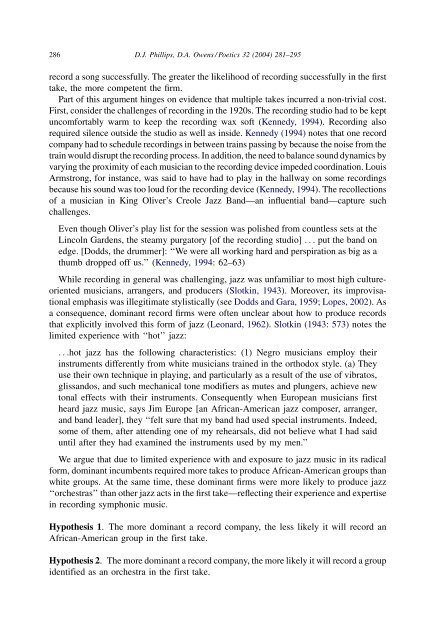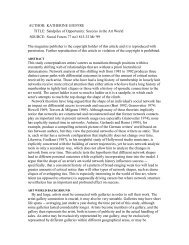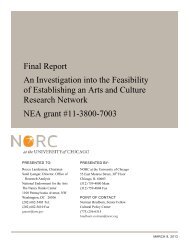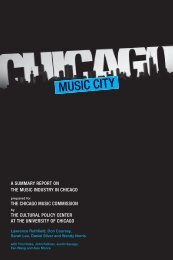Incumbents, innovation, and competence - Cultural Policy Center ...
Incumbents, innovation, and competence - Cultural Policy Center ...
Incumbents, innovation, and competence - Cultural Policy Center ...
Create successful ePaper yourself
Turn your PDF publications into a flip-book with our unique Google optimized e-Paper software.
286 D.J. Phillips, D.A. Owens / Poetics 32 (2004) 281–295<br />
record a song successfully. The greater the likelihood of recording successfully in the first<br />
take, the more competent the firm.<br />
Part of this argument hinges on evidence that multiple takes incurred a non-trivial cost.<br />
First, consider the challenges of recording in the 1920s. The recording studio had to be kept<br />
uncomfortably warm to keep the recording wax soft (Kennedy, 1994). Recording also<br />
required silence outside the studio as well as inside. Kennedy (1994) notes that one record<br />
company had to schedule recordings in between trains passing by because the noise from the<br />
train would disrupt the recording process. In addition, the need to balance sound dynamics by<br />
varying the proximity of each musician to the recording device impeded coordination. Louis<br />
Armstrong, for instance, was said to have had to play in the hallway on some recordings<br />
because his sound was too loud for the recording device (Kennedy, 1994). The recollections<br />
of a musician in King Oliver’s Creole Jazz B<strong>and</strong>—an influential b<strong>and</strong>—capture such<br />
challenges.<br />
Even though Oliver’s play list for the session was polished from countless sets at the<br />
Lincoln Gardens, the steamy purgatory [of the recording studio] ...put the b<strong>and</strong> on<br />
edge. [Dodds, the drummer]: ‘‘We were all working hard <strong>and</strong> perspiration as big as a<br />
thumb dropped off us.’’ (Kennedy, 1994: 62–63)<br />
While recording in general was challenging, jazz was unfamiliar to most high cultureoriented<br />
musicians, arrangers, <strong>and</strong> producers (Slotkin, 1943). Moreover, its improvisational<br />
emphasis was illegitimate stylistically (see Dodds <strong>and</strong> Gara, 1959; Lopes, 2002). As<br />
a consequence, dominant record firms were often unclear about how to produce records<br />
that explicitly involved this form of jazz (Leonard, 1962). Slotkin (1943: 573) notes the<br />
limited experience with ‘‘hot’’ jazz:<br />
...hot jazz has the following characteristics: (1) Negro musicians employ their<br />
instruments differently from white musicians trained in the orthodox style. (a) They<br />
use their own technique in playing, <strong>and</strong> particularly as a result of the use of vibratos,<br />
gliss<strong>and</strong>os, <strong>and</strong> such mechanical tone modifiers as mutes <strong>and</strong> plungers, achieve new<br />
tonal effects with their instruments. Consequently when European musicians first<br />
heard jazz music, says Jim Europe [an African-American jazz composer, arranger,<br />
<strong>and</strong> b<strong>and</strong> leader], they ‘‘felt sure that my b<strong>and</strong> had used special instruments. Indeed,<br />
some of them, after attending one of my rehearsals, did not believe what I had said<br />
until after they had examined the instruments used by my men.’’<br />
We argue that due to limited experience with <strong>and</strong> exposure to jazz music in its radical<br />
form, dominant incumbents required more takes to produce African-American groups than<br />
white groups. At the same time, these dominant firms were more likely to produce jazz<br />
‘‘orchestras’’ than other jazz acts in the first take—reflecting their experience <strong>and</strong> expertise<br />
in recording symphonic music.<br />
Hypothesis 1. The more dominant a record company, the less likely it will record an<br />
African-American group in the first take.<br />
Hypothesis 2. The more dominant a record company, the more likely it will record a group<br />
identified as an orchestra in the first take.









